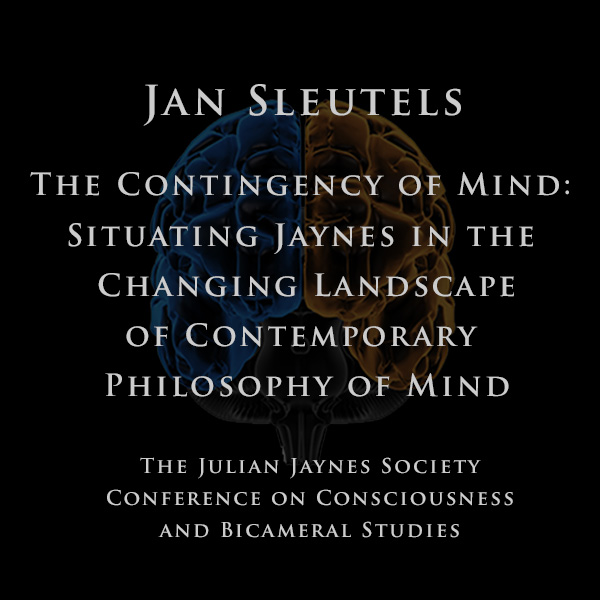Description
Audio download of Professor Jan Sleutels’s lecture “The Contingency of Mind: Situating Jaynes in the Changing Landscape of Contemporary Philosophy of Mind.”
From the Julian Jaynes Society Conference on Consciousness and Bicameral Studies.
Summary: Philosophy of mind in the second half of the twentieth century was dominated by various forms of reductionism and cognitivism. Despite many differences they shared a basically essentialist outlook, holding (mostly implicitly) that mental states, processes, properties, and competencies are properly analyzed as natural kinds. In keeping with this basic presumption, philosophers and cognitive scientists tended to dismiss historical and cultural considerations for purposes of understanding the nature of the human mind.
Among the factors that contributed to this ahistorical bias, three are particularly noteworthy. First, the primary concern of analytical philosophy was conceptual analysis. In the philosophy of mind this took the form of analyzing the conceptual apparatus of folk psychology, trying to establish necessary connections between folk concepts and their cognitive and neural conditions of use. The logical nature of this approach made it non-historical in principle.
Secondly, both cognitivism and reductionism endorsed the idea that the human mind supervenes on the biological brain, which was presumed to be responsive only to pressures on vast, evolutionary timescales. Brain architecture must have been substantially the same throughout most of human history. Hence, the nature of mental states, processes, properties, and competencies must have remained the same as well.
Finally, moral considerations made it hard to think otherwise. According to a long-standing Western tradition, the mind is the seat of human dignity and man’s defining characteristic. From that perspective, changes in the nature of conscious minds on anything short of an evolutionary timescale would seem to compromise the moral unity of mankind. Even if animals and early hominids can be excluded from our peer group (to which some would strongly object), drawing the line any closer to home is insufferable.
Looking back on the intellectual landscape of the 1970s, 80s and 90s, it makes perfect sense that Julian Jaynes was considered a maverick. There was simply no place for his historical approach to consciousness (Jaynes 1976). His theory was rejected on apriori grounds as conceptually incoherent, biologically impossible, and probably also morally suspect (cf. Sleutels 2006).
Today the situation is quite different, however. In the late 1990s the landscape started to shift towards a view of the mind as being contingent upon a variety of external factors. The so-called EEE approach (Embodied, Embedded, Enacted Cognition) drew attention to the ecological and cultural context of psychological competencies, while varieties of the Extended Mind hypothesis pointed up the importance of external tools (including language technologies) for the development of cognitive skills (Clark 2008). Critics of evolutionary psychology are questioning the presumption of psychological continuity that goes with essentialism (Sleutels 2013), while philosophers such as Hutto (2008) argue that our current self-understanding as thinking, conscious agents (our ‘folk psychology’) is contingent on socio-cultural practices.
In this paper I will situate Jaynes’s view of the origin of modern consciousness in the newly emerged landscape. I review some of the most pertinent developments in the philosophy of mind, including work in cognitive archaeology (Malafouris 2008) and so-called ‘radically enactivist’ theories of mind (Hutto and Myin 2013). I conclude by proposing a general argument for the contingency of mind that underscores the importance of Jaynes for future research.
All audio files are in mp3 format. Upon payment you will receive a link to download the file.




